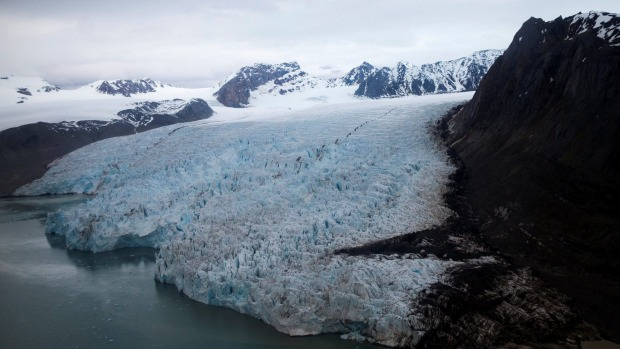 |
| Reviews and Templates for Expression We |
Jonathan Boston: The clock is ticking on our carbon budget

The Blomstrand Glacier in Norway's far north. Arctic sea ice hit its second-lowest summer minimum ever early this month, according to data from the National Snow and Ice Data Center and Nasa. On September 10, sea ice was measured at 1.6 million square miles, which is 911,000 square miles below average. Ocean water that melts each summer and refreezes during winter makes up sea ice, which is typically largest in March.
OPINION: Last week our Government ratified the Paris Agreement to combat climate change. Under the agreement, governments pledged to keep warming 'well below' 2°C above their pre-industrial levels and "to pursue efforts to limit the temperature increase to 1.5°C".
Suppose New Zealand took this pledge seriously. What would it mean for reducing our greenhouse gas emissions?
Any answer must recognise that to keep within the 2°C warming cap there is a relatively fixed cumulative carbon budget. In other words, only a certain amount of carbon dioxide can beemitted before it becomes very likely that the planet's mean surface temperature will rise by more than 2°C.
The size of the cumulative budget is essentially fixed for thousands of years because carbon dioxide is a long-lived gas. Thus, unless we can extract it from the atmosphere and store it safely, our intergenerational budget is capped.
Leading scientists, via the Intergovernmental Panel on Climate Change, have calculated that to have a 50 per cent chance of keeping within the 2°C warming cap, the global budget is about 840 billion tonnes of carbon. This takes into account the warming caused by other greenhouse gases, like methane, at least partially.
Since the industrial revolution, humanity has emitted about 580 billion tonnes of carbon, with annual emissions currently close to 10 billion tonnes. This means there is about 260 billion tonnes left – or roughly 25 years at current rates of emissions. Beyond about 2040, therefore, the global budget will be exhausted – unless emissions are reduced.
To have more than a 50 per cent chance of meeting the global goal, our cumulative budget is smaller and runs out sooner. Likewise, if annual global emissions rise further and plateau at a higher rate, our budget will be exhausted well before 2040.
Imagine allocating the remaining global carbon budget of about 260 billion tonnes on a per capita basis. New Zealand's share of the world's population, of roughly 7.5 billion, is around 0.06 per cent. Assuming every person has equal rights to use the global atmosphere, our share of the global budget would be roughly 150 million tonnes of carbon. At current annual emission rates,of nearly 10 million tonnes of carbon, this budget will be exhausted just after 2030.
This calculation excludes our non-carbon emissions, which represent about half of New Zealand's total greenhouse emissions. It also excludes emissions from international aviation and shipping.
Nevertheless, suppose New Zealand's share is about 150 million tonnes of carbon. Are the government's targets consistent with living within this budget?
The current targets are to reduce our total greenhouse gas emissions by 5 per cent below 1990 levels by 2020, 11 per cent by 2030 and 50 per cent by 2050. There are no separate targets for carbon dioxide.
But suppose our current targets were met solely by reducing carbon emissions, for example from transport, industrial processes and electricity generation. This would mean cutting our carbon emissions to zero by 2050, unless we also make substantial cuts in emissions from agriculture. Would these targets be enough?
Unfortunately, no. Even if our carbon emissions were to decline linearly from now to reach zero by 2050, we would exhaust our share of the global budget before 2050.
The implications are clear. Even if we ignore our substantial non-carbon emissions and achieve zero carbon dioxide emissions by 2050, we would still exhaust more than our fair share of the global carbon budget.
Maybe the Government thinks New Zealanders deserve more of the global budget than one based on a per capita allocation. But why? New Zealand is a relatively affluent country. And New Zealanders have already emitted far more carbon dioxide per capita than their counterparts in developing countries, not least by deforesting to enable agriculture. On what principles of justice might New Zealanders deserve more than others?
There is little point beating ourselves up about historical emissions, but given what we know now, there is no excuse for taking more than our fair share going forward.
Accordingly, adopting a firm commitment to reach zero net carbon dioxide emissions before 2050 is the bare minimum of a credible and defensible policy for New Zealand.
No doubt many people hope the issue of climate change will go away. But it won't. Action on carbon dioxide cannot be postponed, no matter what we do about agricultural emissions. We must take the problem extremely seriously and act now.
|
|
|
|
Copyright remains with the original authors |